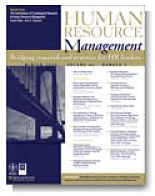Papers
A cross cultural exploratory study of the linkage between emotional intelligence and managerial effectiveness. (2003)
"...in low power distance cultures like as the United States and United Kingdom, self‐awareness of interactive skills may be crucial relative to effectiveness whereas in high PD cultures, such as...
Written by: Shipper, F., Kincaid, J. F., Rotondo, D. M., & Hoffman IV, R. C.
Read morePersonality and leadership: a qualitative and quantitative review. (2002)
“After 'extraversion', 'conscientiousness' and 'openness to experience' were the strongest and most consistent correlates of leadership.” Timothy A. Judge, University of Florida; Joyce E. Bono, University of Minnesota; Remus Ilies...
Written by: Judge, T. A., Bono, J. E., Ilies, R., & Gerhardt, M. W.
Read moreThe long-term organizational impact of destructively narcissistic managers. (2002)
"How to recognize destructively narcissistic managers more quickly and ways other managers, executives, and boards of directors can deal with them Roy Lubit The Academy of Management Executive 16, no....
Written by: Lubit, Roy.
Read moreA study of impending derailment and recovery of middle managers across career stages. (2000)
"Of particular relevance to ... possible behavioural antecedents of hubris as indicated in linguistic markers, past experiences of success/failure etc. on the part of those coming to positions of business leadership."...
Written by: Shipper, F., & Dillard, Jr., J. E.
Read more
Napoleon’s tragic march home from Moscow: lessons in hubris. (2000)
"Using historical material on Napoleon as well as contemporary business examples, they examine the causes of hubris and specific leader behaviors that are likely to result. Guidelines for reducing the...
Written by: Kroll, Toombs and Wright.
Read more
Overconfidence: it depends on how, what and whom you ask. (1999)
"Many studies note that peoples’ confidence in their judgments exceeds their accuracy and that overconfidence increases with the difficulty of the task. However, some common analyses confound systematic psychological effects...
Written by: Klayman, Soll, Gonzalez-Vallejo and Barlas.
Read more
A motivational model of leadership: predicting long-term management success from TAT measures of power motivation and responsibility. (1999)
"In an AT&T longitudinal study of managers, managerial success after sixteen years is predicted by “responsible power,” which is a combination of TAT-based (Thematic Apperception Test) measures of power motivation...
Written by: Winter, David G.
Read more
Implicit power motivation moderates men’s testosterone responses to imagined and real dominance success. (1999)
"Individuals high only in p Power had elevated testosterone after imagining a success in a subsequent dominance contest. They continued to have high testosterone levels after actually winning, but not...
Written by: Schultheiss, Campbell, McClelland.
Read more
Beware the Hubris-Nemesis complex – a concept for leadership analysis
"... introduces the concept of the hubris-nemesis complex .. relatively common, but often unappreciated, and seen in early 1990’s figures such as Fidel Castro, Saddam Hussein, and Slobodan Milosevic David Ronfeldt...
Written by: Ronfeldt, David.
Read more
The organizational fool: Balancing a leader’s hubris. (1990)
".. explores the role of the sage-fool as means of creating a counter-vailing power against the regressive forces inherent in leadership, in other words, to reinforce the leader's capacity for reality...
Written by: Kets de Vries, Manfred F. R.
Read more








